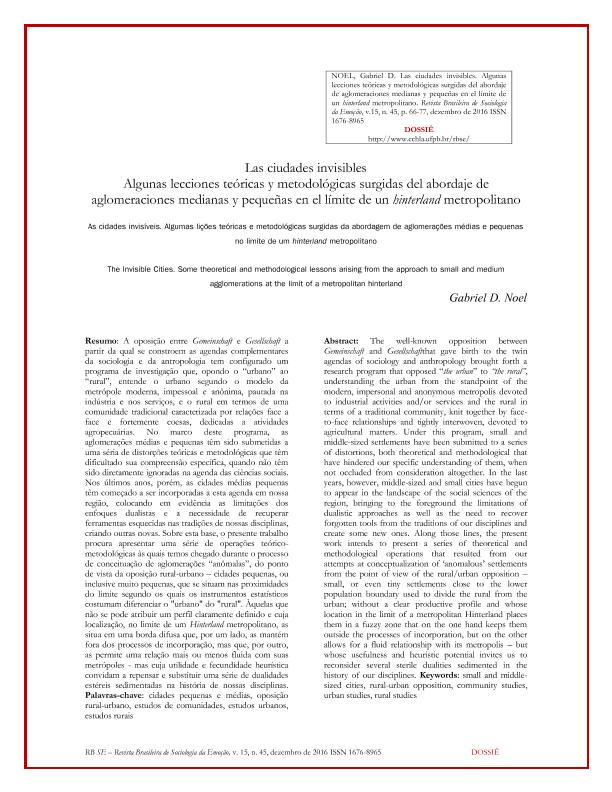Mostrar el registro sencillo del ítem
dc.contributor.author
Noel, Gabriel David

dc.date.available
2022-11-25T18:12:25Z
dc.date.issued
2016-12
dc.identifier.citation
Noel, Gabriel David; Las ciudades invisibles: algunas lecciones teóricas y metodológicas surgidas del abordaje de aglomeraciones medianas y pequeñas en el límite de un hinterland metropolitano; Universidade Federal da Paraíba. Grupo de Estudo e Pesquisa em Sociologia da Emoção; Revista Brasileira de Sociologia da Emoção; 15; 45; 12-2016; 66-77
dc.identifier.issn
1676-8965
dc.identifier.uri
http://hdl.handle.net/11336/179084
dc.description.abstract
A oposição entre Gemeinschaft e Gesellschaft a partir da qual se constroem as agendas complementares da sociologia e da antropologia tem configurado um programa de investigação que, opondo o “urbano” ao “rural”, entende o urbano segundo o modelo da metrópole moderna, impessoal e anônima, pautada na indústria e nos serviços, e o rural em termos de uma comunidade tradicional caracterizada por relações face a face e fortemente coesas, dedicadas a atividades agropecuárias. No marco deste programa, as aglomerações médias e pequenas têm sido submetidas a uma séria de distorções teóricas e metodológicas que têm dificultado sua compreensão específica, quando não têm sido diretamente ignoradas na agenda das ciências sociais. Nos últimos anos, porém, as cidades médias pequenas têm começado a ser incorporadas a esta agenda em nossa região, colocando em evidência as limitações dos enfoques dualistas e a necessidade de recuperar ferramentas esquecidas nas tradições de nossas disciplinas, criando outras novas. Sobre esta base, o presente trabalho procura apresentar uma série de operações teóricometodológicas às quais temos chegado durante o processo de conceituação de aglomerações “anômalas”, do ponto de vista da oposição rural-urbano – cidades pequenas, ou inclusive muito pequenas, que se situam nas proximidades do limite segundo os quais os instrumentos estatísticos costumam diferenciar o "urbano" do "rural". Àquelas que não se pode atribuir um perfil claramente definido e cuja localização, no limite de um Hinterland metropolitano, as situa em uma borda difusa que, por um lado, as mantém fora dos processos de incorporação, mas que, por outro, as permite uma relação mais ou menos fluida com suas metrópoles - mas cuja utilidade e fecundidade heurística convidam a repensar e substituir uma série de dualidades estéreis sedimentadas na história de nossas disciplinas.
dc.description.abstract
The well-known opposition between Gemeinschaft and Gesellschaftthat gave birth to the twin agendas of sociology and anthropology brought forth a research program that opposed “the urban” to “the rural”, understanding the urban from the standpoint of the modern, impersonal and anonymous metropolis devoted to industrial activities and/or services and the rural in terms of a traditional community, knit together by faceto-face relationships and tightly interwoven, devoted to agricultural matters. Under this program, small and middle-sized settlements have been submitted to a series of distortions, both theoretical and methodological that have hindered our specific understanding of them, when not occluded from consideration altogether. In the last years, however, middle-sized and small cities have begun to appear in the landscape of the social sciences of the region, bringing to the foreground the limitations of dualistic approaches as well as the need to recover forgotten tools from the traditions of our disciplines and create some new ones. Along those lines, the present work intends to present a series of theoretical and methodological operations that resulted from our attempts at conceptualization of ‘anomalous’ settlements from the point of view of the rural/urban opposition – small, or even tiny settlements close to the lower population boundary used to divide the rural from the urban; without a clear productive profile and whose location in the limit of a metropolitan Hinterland places them in a fuzzy zone that on the one hand keeps them outside the processes of incorporation, but on the other allows for a fluid relationship with its metropolis – but whose usefulness and heuristic potential invites us to reconsider several sterile dualities sedimented in the history of our disciplines.
dc.format
application/pdf
dc.language.iso
spa
dc.publisher
Universidade Federal da Paraíba. Grupo de Estudo e Pesquisa em Sociologia da Emoção

dc.rights
info:eu-repo/semantics/openAccess
dc.rights.uri
https://creativecommons.org/licenses/by-nc-sa/2.5/ar/
dc.subject
CIUDADES PEQUEÑAS Y MEDIANAS
dc.subject
OPOSICIÓN RURAL-URBANO
dc.subject
ESTUDIOS DE COMUNIDAD
dc.subject
ESTUDIOS URBANOS
dc.subject.classification
Otras Sociología

dc.subject.classification
Sociología

dc.subject.classification
CIENCIAS SOCIALES

dc.title
Las ciudades invisibles: algunas lecciones teóricas y metodológicas surgidas del abordaje de aglomeraciones medianas y pequeñas en el límite de un hinterland metropolitano
dc.title
As cidades invisíveis: algumas lições teóricas e metodológicas surgidas da abordagem de aglomerações médias e pequenas no limite de um hinterland metropolitano
dc.title
The Invisible cities: some theoretical and methodological lessons arising from the approach to small and medium agglomerations at the limit of a metropolitan hinterland
dc.type
info:eu-repo/semantics/article
dc.type
info:ar-repo/semantics/artículo
dc.type
info:eu-repo/semantics/publishedVersion
dc.date.updated
2022-11-25T12:08:10Z
dc.journal.volume
15
dc.journal.number
45
dc.journal.pagination
66-77
dc.journal.pais
Brasil

dc.journal.ciudad
Joao Pessoa
dc.description.fil
Fil: Noel, Gabriel David. Consejo Nacional de Investigaciones Científicas y Técnicas; Argentina. Universidad Nacional de San Martín. Instituto de Altos Estudios Sociales; Argentina
dc.journal.title
Revista Brasileira de Sociologia da Emoção

dc.relation.alternativeid
info:eu-repo/semantics/altIdentifier/url/http://www.cchla.ufpb.br/rbse/
Archivos asociados
